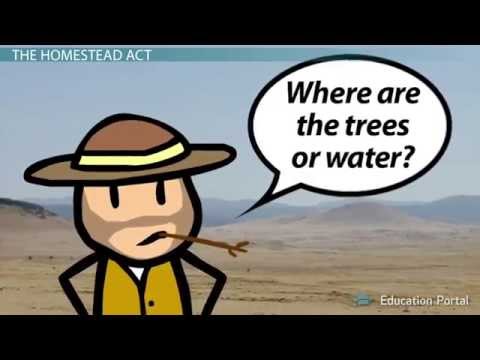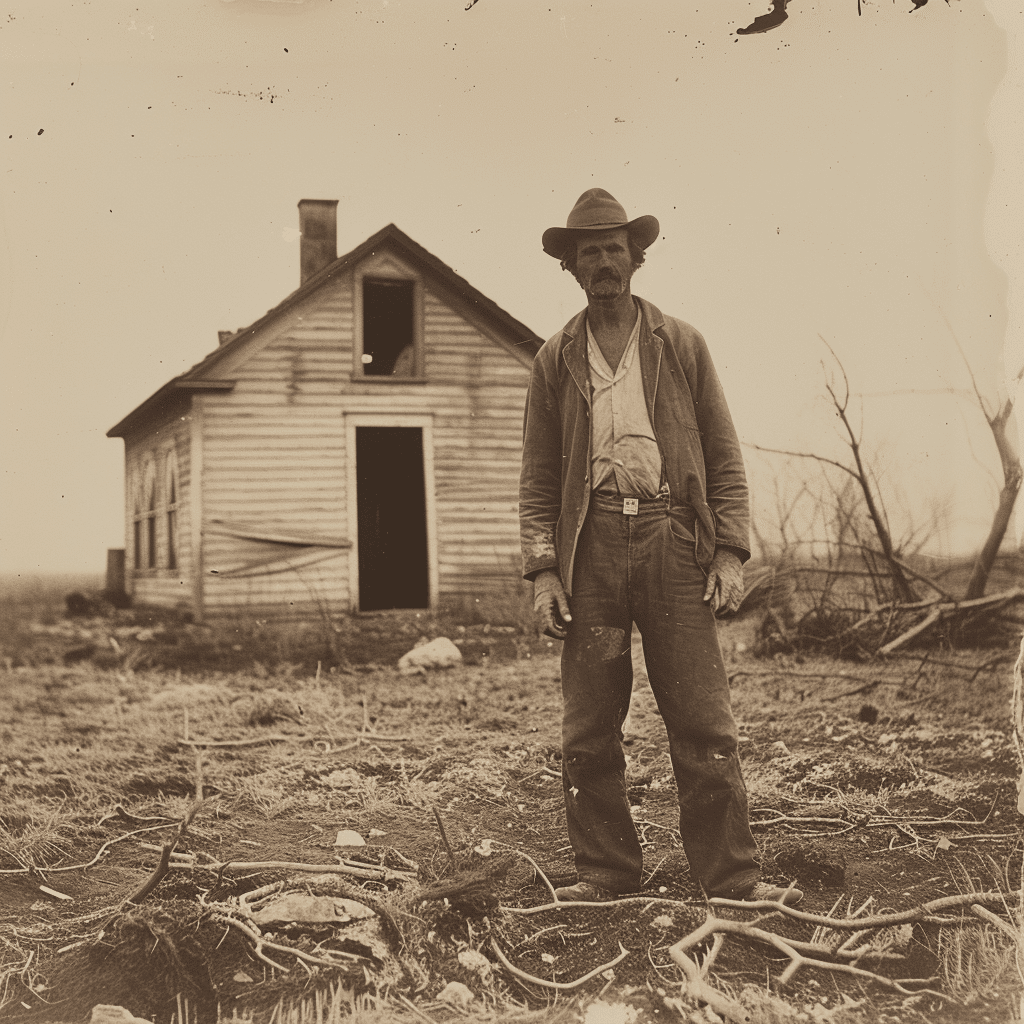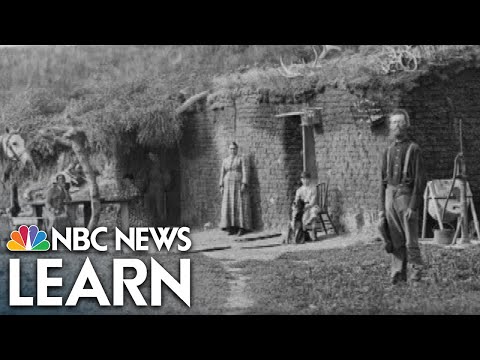In the grand tapestry of American history, few pieces of legislation have left a more indelible mark on the land and soul of the nation than the Homestead Act. Enacted amidst the turmoil of the Civil War in 1862, it was a bold initiative to promote the settlement and development of the American West, offering a tantalizing suite of possibilities for pioneering souls. A crazy fact indeed, the Homestead Act granted 160 acres of surveyed government land to hardy individuals willing to transform wilderness into thriving communities. Today, let’s amble through a historical journey, unpacking this landmark policy and assessing its myriad of impacts on the very makeup of America.

The Homestead Act: Catalyst for American Expansion
In May 1862, America was at war with itself, yet the wheels of progress trudged onward with President Abraham Lincoln’s signature – birthing the Homestead Act. This law was not just a page in history; it was an open invitation to the common man, the dreamer, the brave soul yearning to carve out their destiny from the raw American landscape.

Homestead Act in Action: Pioneering Lives
The prairies and mountainsides didn’t turn into fields and homesteads overnight. It took grit, sweat, and no small amount of perseverance.

| Aspect | Details |
|---|---|
| Name of Act | Homestead Act of 1862 |
| Date Enacted | May 20, 1862 |
| Purpose | To encourage the settlement and development of the American West by distributing government land to private individuals. |
| Land Allotment | 160 acres of surveyed government land |
| Eligibility Criteria | – Must be an adult U.S. citizen or intended citizen. |
| – Must never have borne arms against the U.S. government. | |
| – Must agree to farm the land and make improvements. | |
| Process to Acquire Land | 1. File an application. |
| 2. Improve the land (build a dwelling and farm the land for at least five years). | |
| 3. File for deed of title (proof of improvement and continuous residence). | |
| Economic Impact | Spurred economic growth and led to the distribution of millions of acres of land to individual settlers, fostering the expansion of farming operations. |
| Homestead Protection | Protects a portion of a homeowner’s equity from creditors. |
| Homestead Protection Types | 1. Automatic homestead: Protection that occurs by law. |
| 2. Declared homestead: Protection that must be claimed through a legal declaration. | |
| Example: Missouri Homestead Law | – Allows for a $15,000 exemption. |
| – Applies to “a dwelling house and appurtenances, and the land used in connection therewith.” | |
| Nationwide Impact | Paved the way for the rapid expansion of the United States westward and the growth of agrarian economies, which helped strengthen the nation’s infrastructure. |
The Economics of Homesteading: Analysis of Financial Implications
The Homestead Act wasn’t purely about settlement; it played a clever economic hand too.

Policy Mutation: From the Original Homestead Act to Modern Adaptations
Like any hearty perennial, the Homestead Act evolved with the passing years.

Homestead Act Through the Lens of Social Change
The act was more than a transaction of land; it was a chisel reshaping American society.
Environmental Footprint: The Ecological Impact of the Homestead Act
The monumental land distribution altered not just lives, but the environment as well.
A Legal Dissection of the Homestead Act: Rights and Regulations
Legalese alert – let’s decode the Homestead Act’s legal framework.
Beyond the Acreage: The Cultural and Psychological Impressions of Homesteading
Dig a bit deeper, and you’ll find that this act touched the very soul of America.
Homesteading in the 21st Century: Not a Relic But a Reverberation
Fast forward to our sleek, connected world of today, and echoes of that homesteading spirit ripple through modern initiatives.
The Homestead Act’s Influence on Current Housing and Land Ownership Trends
Homesteading’s legacy is not etched in stone; it’s sown in the very terrain of modern America.
Conclusion: Valuing Our Homestead Heritage
So there we have it, friends—a mosaic of tenacious individuals, vast landscapes, and transformative legislation. The Homestead Act bestowed upon ordinary folk a gift that reshaped a nation’s future. It’s a narrative woven into the gravitas of America’s history, echoing the lullabies of prosperity and the rugged anthems of toil and triumph.
Embark on your odyssey, understand the roots of the ‘homestead’, and, in the legacy of those 160-acre visionaries, carve out your slice of the dream with knowledge as your compass and wisdom as your guide.
Uncovering the Quirks of the Homestead Act
Alright, folks—let’s take a deep dive into the dusty pages of history and uncover some fun tidbits about one of America’s pioneering pieces of legislation, the homestead act. Hold onto your hats, because this isn’t your typical history lesson!
160 Acres of Possibility
Can you imagine just waltzing onto a piece of land, staking your claim, and boom—you’re a property owner? Well, back in the day, the homestead act turned that wild dream into reality for many Americans. They were given 160 acres to call their own, which sounds like a sweet deal on paper. But here’s the kicker: the land was often unforgiving, with nary a Walmart in sight for those “uh-oh, forgot to buy a plow” moments.
A Cornucopia of Characters
Oh, the stories this act could tell! From hopeful farmers with determination in their eyes to the crafty speculators trying to game the system, the homestead act drew a thrilling mix of people. It wasn’t just about the soil – no siree. The race to the West was peppered with all sorts of drama, just like an episode of that show where everyone backstabs each other, but with more shovels and less wifi.
The Nitty-Gritty of Land Claiming
Now, let’s not sugarcoat it—staking a claim wasn’t all sunshine and rainbows. These pioneers had to prove they meant business. This wasn’t just a “grab the land and ghost” situation; settlers had to improve the land, build a dwelling, and farm the heck out of that soil for five years before they could call it theirs. That’s a longer commitment than most of my houseplants survive.
A Legacy That Lasts
You might be sitting there, scrolling on your smartphone, thinking this is all ancient history. But hold your horses! The effects of the homestead act can be felt even today. From how property lines are drawn to the roots of rural communities, those 160-acre plots laid the groundwork for modern America’s map. It’s kinda like how your grandpa’s questionable fashion choices somehow made their way into your wardrobe—unexpected, but you can’t deny the influence.
So, there you have it—a smorgasbord of snippets about a law that changed the American landscape, quite literally. Who said history had to be a snooze-fest? With tales of hardship, adventure, and a whole lot of elbow grease, the homestead act isn’t just a chapter in a textbook; it’s a testament to the grit and gusto that built the foundations of the United States. Now, don’t be shy about diving deeper into the homestead act’s legacy—after all, knowing your roots is always in vogue.

What are the homestead laws in Missouri?
– Down in Missouri, the Homestead Law shields you up to a cool $15,000 for your main squeeze – that’s your house, and any little extras that come with it (like a garage or a shed), plus the dirt they’re standing on. Simply put, it keeps a slice of your home’s value safe from creditors, in case things get a bit hairy.
What are the homestead laws in Arkansas?
– Arkansas has its rules and quirks with homestead laws. If you’re flying solo, you can protect up to $800 in urban areas or 80 acres in rural digs. But if you’re hitched or have kiddos, you can bump that up to $1,250 or a sprawling 160 acres out in the sticks. It’s about giving you a leg up to keep your home under your hat when the financial storm clouds roll in.
What are the homestead laws in Idaho?
– Idaho’s homestead laws play it pretty cool by letting you safeguard up to $100,000 of your home value. Whether your kingdom’s a city loft or a country ranch, they’ve got your back so you won’t lose the roof over your head when you hit a rough patch with dough.
What is the Homestead Act in MA?
– Bay Staters, listen up! The Homestead Act in MA is your suit of armor against debts that could snatch your castle away. Stamp your claim with protection up to $500,000 on your primary crib, but here’s the catch: you’ve got to file a declaration with the registry to make sure your home base is safe and sound.
Who qualifies for the homestead exemption in Missouri?
– In the Show-Me State, to snag a homestead exemption, you just gotta be the king or queen of your castle – that means it’s gotta be your main hangout spot. Keep in mind, if you’ve ever picked up arms against Uncle Sam, you’re outta luck. But hey, for most folks, it’s open season – so come and get it!
How do I homestead my house in Missouri?
– Want to get your homestead on in Missouri? Easy-peasy. Make sure that little piece of heaven is where you hang your hat most days and zap an application over to your local assessor’s office. Keep it cool for tax season, and bada bing, bada boom – you’ve just homesteaded your house!
Can you live off a homestead?
– Homesteading isn’t just for history buffs; you can totally live off your homestead. Grow your veggies, raise some clucky chickens, perhaps milk a cow or two – and voilà! You’ve got a slice of self-sufficient paradise. But let’s keep it real: you’ll need some serious elbow grease and a dollop of grit to make it work.
What are homesteading laws in the states?
– Homesteading laws in the states are like a patchwork quilt – each with its own pattern. While the heart and soul remain true to the OG Homestead Act, every state has tailored the vibe to suit its folks, from the amount you can protect to the nitty-gritty of qualifying. It’s all about giving you a fighting chance to carve out your piece of the American Dream.
How long must a homesteader occupy the land before full ownership?
– Before you can shout, “This land is my land!” a homesteader had to play the long game – we’re talking five years of TLC on their patch of dirt, making it blossom into a thriving homestead. After half a decade of blood, sweat, and maybe a few tears, Uncle Sam would hand over the deed, tying the bow on the American pioneer package.
Do you have to live in your homestead in Florida?
– Florida’s rules are pretty chill, but to claim your homestead exemption, you’ve actually gotta plant your feet in the Sunshine State. It’s not a snowbird’s fly-by; your home crib in Florida has gotta be your full-time gig to wave that homestead flag.
What is homestead eligibility in Florida?
– To get the homestead high-five in Florida, you need to be a permanent resident living in your digs full time. That means you can’t just dip your toes in the water – you’ve gotta dive in year-round. And yeah, you’ve gotta make it official by planting your flag with the property appraiser’s office.
How much land can you homestead in Idaho?
– If you’ve set your sights on Idaho for homesteading, they roll out the welcome mat by letting you protect up to $100,000 of your spread. That’s a decent chunk of change that can’t be touched, even if life throws you a financial curveball. So, you can breathe easy knowing that your homestead is your safe harbor.
Can a husband and wife homestead in different states?
– Talking about homesteading, when it comes to spouses doing their own thing in different states, states can get real territorial. Each state has its own playbook, and usually, they want you to stick together under one roof to qualify. So, it’s a bit of a juggling act and you’ll need to check the local rules before making a move.
What are 3 parts of the Homestead Act?
– The Homestead Act of ye olden days had a simple but mighty three-step technique: (1) File a claim on a sweet piece of government land, (2) roll up your sleeves and make that land sprout beans or whatever floats your boat, and (3) after five years of playing Mother Nature, strut on up and file for the title deed. Rinse and repeat!
Who is excluded from the Homestead Act?
– If you were playing for the other team, as in taking up arms against the good ol’ US of A, the Homestead Act gave you a cold shoulder – no land for you. Other than that, pretty much any adult who wanted to pledge allegiance could step up and stake their claim.
What are the benefits of homesteading in Missouri?
– Homesteading in Missouri is a peach, offering sweet perks like tax breaks, a slice of that self-reliant life, and a comforting blanket of protection cast around your humble abode. It’s like your financial safety net, keeping you snug and cozy in the home you’ve put your heart into.
At what age do seniors stop paying property taxes in Missouri?
– Seniors in Missouri get to hang up their property tax hats at age 65, or when they’re permanently disabled, whichever scoreboard they’re on. And get this – if you’re a veteran with a total disability from service, you might just hit the jackpot with a full exemption. It’s like Missouri’s way of tipping its hat and saying thanks.
Does Missouri have a Homestead Act for seniors?
– Sure enough, the Show-Me State flashes a warm grin at seniors with the Homestead Preservation Credit. It’s like a cozy fireplace keeping property taxes from going through the roof if you’re 65+, disabled, or snuggling up below the income line. It’s just a little ‘we got you’ from ol’ Missouri.
Is Missouri a good place to homestead?
– If homesteading sounds like your cup of tea, Missouri’s not half bad. You’ve got favorable homestead protection, some decent land, and a friendly nod from the taxman. Throw in the state’s heartland charm, and it’s like finding a four-leaf clover in your backyard. Just keep one eye on the weather, and you’re golden!



